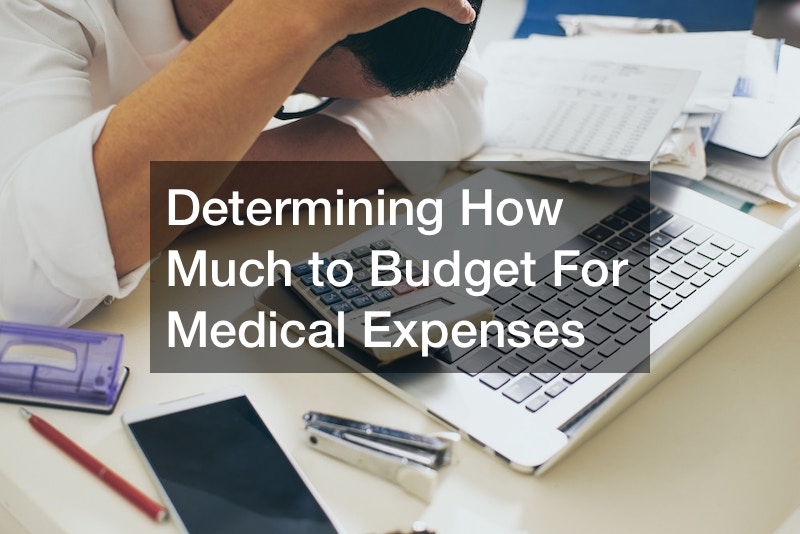
Healthcare should be among your priorities in your budget, along with housing, food, and other essentials. However, most people do not spare money for medical expenses. Although you may have health insurance, it may not be enough to cover all your medical expenses.
The obvious starting point when budgeting for healthcare is insurance. You could also invest in a healthcare alternative like Jericho Share. Although health insurance or one of its many alternatives is a big part of your medical expenses, you should have some emergency funds to cater for unexpected health emergencies. This article guides you on how much to budget for medical expenses.
This article first takes you through the various types of healthcare costs you should consider. You will then be guided on how to plan and allocate funds for each type of medical expense. We will also talk about health savings accounts, which are important tools that can help you in managing your medical expenses.
Which Healthcare Costs to Consider

The first in this guide on how much to budget for medical expenses is identifying the different types of healthcare costs you should consider. These are areas where you’ll need to spend money if you want to be sure that all types of medical issues are well catered for. Let’s have a look at some of them.
Health Insurance
This is the most obvious and easy to predict medical expenses because of the fixed amount you pay every month. It’s easy to budget for our health insurance premiums because they’re predictable.
Monthly insurance premiums are the most obvious medical expenses. Your employer may cover this expense for you. For the unemployed or self-employed, the alternative is private insurance. Ensuring that your premiums are uptodate relieves you of the headache of high medical billing costs for specific conditions.
There are additional expenses that come with insurance. We cannot fail to mention these additional costs to ensure you have all details on how much to budget for medical expenses.
Deductibles: Before your insurance comes in to cover your medical expenses, you have to pay the hospital or clinic with your own money. This is one of the reasons why, despite having health insurance, you should spare some money for healthcare costs. Deductibles are some of the highest medical expenses you’ll have
Co-pay: This is a fixed amount you pay for prescription medications or medical services. Co-pay is also factored in your deductibles.
Out-of-pocket max: This is the maximum amount you’ll pay in a year for medical expenses before our insurance covers 100%. This is a larger amount than your deductible. This is the expense to consider for the worst case scenarios,not your occasional visit to your massage therapist.
Co-insurance: This is a fixed percentage you pay for for healthcare services, even after meeting your deductible. This is a tricky expense to consider when planning on how much to budget for medical expenses. If you have already factored your out-of-pocket as your baseline, you don’t have to worry about co-insurance.
Emergency Medical Costs
When drawing your budget, you need to plan for emergencies, and that includes medical emergencies. Unexpected medical expenses may include treatment for an accident,coming down with an illness, or needing urgent medical advice from a family doctor. When it comes to things to consider on how much to budget for medical expenses, it’s easy to ignore emergency emergency medical costs, but you should not.
Routine Medical Expenses
We have already covered one of the routine medical expenses you have to consider – health insurance. It is routine because you pay monthly premiums. However, you have to consider other routine medical expenses. If you have anticipated wellness clinic visits, this is a routine cost
Your over the counter medications like allergy drugs are considered as routine medical expenses. Other examples are hearing aid, new contact lenses, or eye glasses. Any medical equipment or drugs that you need on a routine basis falls under this category. Although they may seem as small and negligible expenses, they can add up to be unbreakable expenses.
Planning Your Healthcare Budget

Now that you know what comprises your total medical expense, you can plan on how to allocate money for each of the segments. The plan will help you estimate how much to budget for medical expenses for each specific part. For example, you should know how much should go to insurance premiums and how much to use for routine medications
Insurance Premiums
It is easy for people who are employed and covered by their employers because the process is automated. However, you can still go for private insurance.
We have already broken down for you the various costs that add up to your health insurance expenses such as deductible and copay. Take time to evaluate various health insurance companies, what they offer, their terms, and premiums. This will help you choose the best insurance plans for your family. Remember, when it comes to insurance, premiums are a major factor when considering how much to budget for medical expenses.
Choosing a reliable insurance means that your medical bills will be handled stress-free, whether the hospital does their billing inhouse or does medical billing outsourcing. The amount of premiums that go into the plan depends on various factors. For example, if you or a family member has a prevailing medical condition, expect to pay higher premiums.
Besides premiums and associated costs such as deductible and copays, you should also confirm if your preferred hospitals, pharmacies, and doctors are covered.
Allocation for Routine Medical Expenses
Set aside a specific portion of your income for regular or anticipated medical services and drugs. These are some of the easy medical expenses to predict because of their frequency.
Some routine medical prescriptions are essential to the survival and well-being of some patients. For example, hypertensive patients may have to take their medications at specific times without delays. Therefore, allocation for routine medical expenses is as important as other medical expenses.
Emergency Healthcare Funds
Consider scenarios where something unexpected happens and you need emergency healthcare. For example, you or a family member may be involved in an accident and need chiropractic treatment. Considering that chiropractic clinics are not cheap, If you didn’t have emergency funds set for this type of emergency, you may find yourself in a difficult situation.
Create an emergency fund to cater for unexpected emergencies. Some of the unexpected emergencies to be covered in your emergency fund are health emergencies. Experts recommend that your emergency fund should have at least three to six months of your living expenses. This will allow you to pay for unexpected emergencies without having to take a loan or dip into your savings.
Health Savings Accounts
In addition to your emergency fund, you should take advantage of health savings accounts. These healthcare savings accounts are typically funded by employers. Therefore, this account can help you cover various health expenses. There are three health saving tools you should consider.
Health Savings Account – HSA
Consider this type of account if you’re enrolled in a high deductible insurance plan. Through a HSA, you can put money away on a pre-tax basis for specific health expenses. Eligible health expenses include prescriptions, eye glasses, and dental work. Contributions for HSA can be made by you or come from your employer. Contributions can also be made by anyone who wants to fund the account – a relative can contribute.
HSA is a great long term tool for your healthcare plan because the funds roll over from year to year. As you plan to take this option, please note there is a limit on the annual contribution you can make.
Health Reimbursement Arrangement/Health Reimbursement Account – HRA
Compared to HSA which can be funded by you, your employer, or anyone who wants to contribute to the account, HRA is solely funded by your employer. In addition, you can spend funds on predetermined medical expenses.the remaining amount in the account can be rolled over to the next year. However, you can’t take the funds with you if you leave the company.
Flexible Spending Account – FSA
FSA works differently from the two options above. If you opt for a flexible spending account, a specific amount of money is taken away from your paycheck. This amount is pre-taxed and deposited to an account. This account caters for or is only used for qualified medical expenses.
you and your employer can contribute to the FSA account. There is a maximum contribution allowed by law. The other difference between FSA and the two plans above is that it doesn’t roll over at the end of the year.
Consider New Health Costs
New health costs are not necessarily unexpected health emergencies. For example, if your wife is pregnant, there is a foreseeable medical expense in future, and you should make plans to cover the expenses adequately.
People living with specific health conditions should also consider new health costs, just in case the medical condition requires alternative medication or more interventions.
Building Your Annual Healthcare Budget

You may want to know the exact figures that should go to your health budget every year. Well, how much to budget for medical expenses depends on many factors such as our income, size of your family, age, health condition, and the average cost of health care in your city or state.
You need to figure out how much of your monthly or annual income should go to healthcare, the same way you budget for food, rent, and clothes.specifically, you should figure out how much should go to your premiums, how much you should save for emergencies, and estimate your routine medical expenses. If you have a pet like a dog, you should also consider the cost of consulting an animal doctor when your dog falls sick
Experts recommend setting aside 5% of your net income for your healthcare costs. You can also use your past medical records and expenses to estimate how much you should set aside for healthcare costs. For example, if you have been getting dental care at least once a year, you already know that this is something that should go into your annual medical expenses and how much it costs
take your estimated annual healthcare costs and divide by 12 to figure out how much you should spend on healthcare each month. You should further sub-divide the amount into what goes to monthly premiums, what goes to routine costs for prescriptions, and what goes to out-of-pocket max.
Your budgetary allocation to health will also depend on additional consultations or services that you need as part of your well-being or lifestyle. For example,if you visit a massage therapist at least once a month, have to see a dermatologist once in several months, or see a psychologist, then you should increase our allocation appropriately.
Prioritize Your Health

Your health and that of your loved ones should be at the top of your priority list. This priority should inform you on the amount or how much to budget for medical expenses.
Your healthcare expenses should fall between your necessities like food, rent or mortgage, taxation, phone, and transportation. If you are able to pay for your phone bills but unable to pay for your medical prescriptions, it means that you’ve prioritized communication over your health.
You should think of your healthcare as a need, not just another miscellaneous expense in your budget. Adjusting your mindset to treat healthcare as a need and not a want will help you prioritize medical expenses and allocate enough funds for your medical emergencies, health insurance premiums, and your routine medical expenses.
Start Planning Today
When it comes to planning for your healthcare costs, it’s easy to procrastinate, especially if everyone around you is healthy and fit. However, anything can happen anytime, and you should be able to comfortably cover for your medical expenses anytime. Knowing how much to budget for medical expenses is not enough, you should implement the plan.



